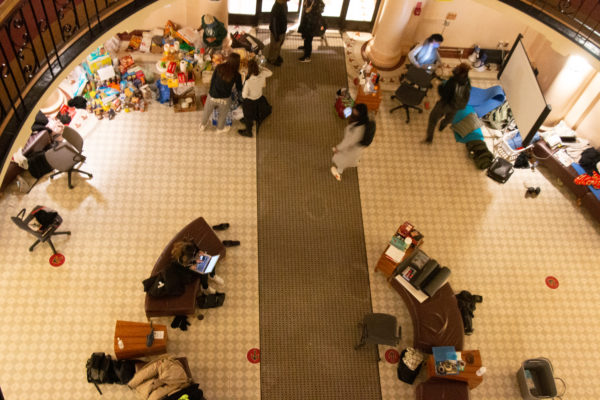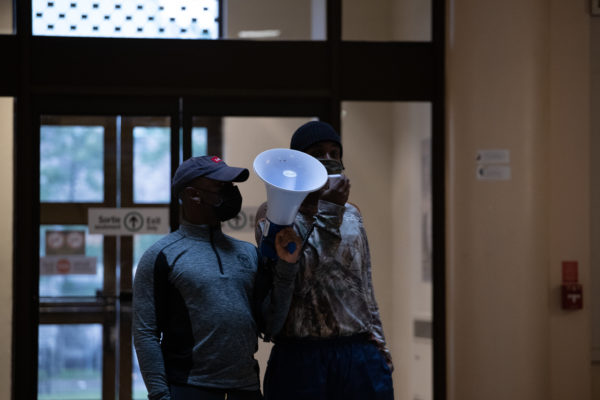Provost did not attend uRacism’s proposed meetings at 1 p.m. and 3 p.m on Wednesday, instead proposing meeting on Thursday at 1 p.m. with uRacism leadership
More than 120 hours after it began, the sit-in in Tabaret Hall’s lobby has come to an end. Protesters have decided to end the sit-in citing health and safety concerns due to the pandemic and the upcoming exam period.
The sit-in which was organized by the uRacism collective demanded a meeting with Jacques Frémont, president of the University of Ottawa, and Jill Scott, provost and vice-president, academic affairs. Protesters wished to address with Frémont and Scott a number of concerns with the new University of Ottawa Action Committee on Anti-Racism and Inclusion.
“It is extremely unfortunate [that] after more than a 120 hours here at the University of Ottawa sleeping on floors, confronting racists, dealing with a variety of issues trying to protest amid a pandemic, we have still yet to hear a response while both Jill Scott and Jacques Frémont speak to other organizations in an effort to conquer and divide us. We will not let this happen,” said Jamal Koulmiye-Boyce, one of the spokespersons for uRacism in a press conference on Wednesday afternoon.
“Due to this lack of response, the pandemic and other student concerns, we will now have to call to an end our sit-in.”
“We also have to take into account the safety of our allies, friends and families and those who came out to support us. While the university does not care about our safety, we cannot risk the safety of those here,” added Koulmiye-Boyce.
On Monday afternoon, two white middle-aged men attempted to interrupt the sit-in by screaming racial slurs at protesters. Protesters were able to peacefully escort the two men out of Tabaret Hall. Koulmiye-Boyce explained that the protesters were facing “other security threats” and that the “U of O’s inaction emboldens more racists,” the organization said they feared for a “violent attack.”
In spite of ending the physical sit-in, uRacism protesters plan to keep applying pressure on Scott and Frémont through their different social media platforms and by email.
“As we continue this action, we will move it more to an online basis. Please continue sending these emails, please continue to engage with uRacism and please continue to have these conversations not only within your household but make your voices heard in the community that you want to have built,” said Koulmiye-Boyce.

Scott reaches out to uRacism
On Tuesday afternoon, Scott reached out to Jason Seguya, the University of Ottawa Students’ Union (UOSU) equity commissioner and uRacism’s spokesperson wishing “to engage in constructive dialogue.”
“Many thanks for reaching out. I am deeply concerned about the situation in which we find ourselves and am keen to engage in constructive dialogue in pursuit of our common commitment to anti-racism and inclusion on our campus,” wrote Scott, in her email to Seguya which was forwarded to the Fulcrum.
“I would be pleased to meet with you and to speak about these important issues.”
Seguya replied to Scott with a link to a Zoom meeting demanding for a meeting to take place on Wednesday afternoon at 1 p.m., the 120 hour mark of the sit-in. In his reply, the uRacism spokesperson spoke about the “disconnect” between the administration and Black students.
“During this time, Black students have once again been subject to trauma, both directly and vicariously, to have the opportunity to engage in a meaningful dialogue about actual tangible changes and actions,” wrote Seguya. “The lengths that we’ve had to meet with you indeed show a disconnect with us, despite these initiatives.”
Seguya also requested that Frémont be present at the meeting. About 20 minutes before the scheduled start of the meeting, Scott emailed Seguya asking for the meeting to take place on Thursday at 1 p.m.
“I do want to meet with you and to have this discussion, and in order to ensure that we are able to have a meaningful dialogue I would like to respectfully request that we set the meeting for tomorrow, December 10, at 1 p.m. in order to prepare on both sides,” wrote Scott.
Scott also requested that the meeting be confidential and for Seguya to provide an agenda and list of attendees.
“I think it is in the interest of everyone that we agree on certain things before we come to the table,” wrote Scott in her email. “For example, that we have appropriate ground rules that will help us to respect the integrity of the conversation and the integrity of the process, for example the confidentiality of our discussion, who will be present, and what will be the agenda. If you have other suggestions for conditions that you believe are important for your group, we invite you to specify these.”
After Scott and the administration failed to attend their requested meeting on Wednesday afternoon at 1 p.m., members of uRacism held a press conference and Seguya sent an email to Scott condemning her and Frémont for pushing back the meeting to Thursday afternoon.
“Respectfully, we’ve been making every single accommodation possible in order to engage in this conversation with you all. We’ve slept on your floors, and couches and we’re confronted by racists all in order to receive so much as a response,” wrote Seguya in his email to Scott on Wednesday afternoon.
“This has taken too long, and the request to further delay this discussion truly is insulting. As we speak, this request for dialogue continues to cause us harm, hence why we’re asking for pro activity to discuss these points.”
“We are tired. The best I can do is extend our call for a meeting until 3 p.m. today. Please step up or step down”
The provost did not attend uRacism’s proposed meeting at 3 p.m.
The uRacism leadership decided not to attend the in camera meeting proposed by Scott on Thursday at 1 p.m.
Scott meets with athletes on anti-racism and inclusion
On Wednesday afternoon, at the same time uRacism was holding a press conference, Scott tweeted that she had met with University of Ottawa varsity student athletes to discuss matters of anti-racism and inclusion.
According to women’s rugby player Tylo Borsboom — who was not present at the meeting — five athletes from five different varsity teams attended the meeting.
The Fulcrum reached out to the five athletes in an effort to uncover what was discussed in the meeting. The athletes have either yet to respond to the Fulcrum or declined to comment.
Borsboom stated that the meeting had been planned before the start of the sit-in.
“The meeting with athletes had been planned a long time ago before the protest started,” wrote Borsboom in a message to the Fulcrum. “It was just disrespectful for her to tweet that knowing that there were students who have been literally sleeping on the floors outside her office for nights now waiting to be offered the same opportunity.”
A number of students, alumni and members of the U of O community were outraged by Scott’s tweet and did not mince words when replying to her tweet.
Scott did not reply to the Fulcrum’s request for comment.
Frémont condemns actions of men who shouted racist slurs at protesters
On Monday at the U of O’s Board of Governors (BOG) meeting, the U of O president condemned the actions of the two men who tried to interrupt the sit-in and shouted racial slurs at the protesters specifying that they “do not belong [to] the University of Ottawa community.”
“Since last Friday, a group of students has held their protest in Tabaret Hall’s rotunda. We respect their right to express their point of view on such a critical topic,” said Frémont, on Monday about the sit-in.
Frémont did not comment on if he would meet with the protesters.
“For more than a year now, we have been listening and we continue to listen to these students, as well as many other BIPOC students, faculty and staff.”
“We continue to hear their very sincere concerns and the pain they have felt as a result of their lived experiences on our campus.”
President explains decision to disband Advisory Committee
The U of O president then explained the administration’s decision to disband the President’s Advisory Committee on Anti-Black Racism and to create a new action-based committee in its stead.
“After a year of meetings, the consensus was that the committee had proved to be ineffective,” stated Frémont. “So, we acted on the advice of our student representatives on this Board, as well as others in our community including committee members, that the committee needed to shift to a committee of action.”
“The new Action Committee will review the action plan and all recent proposals from all groups, revise it as necessary, make additional recommendations if required and recommend and oversee specific targets and outcomes.”
“There is common ground among us all about the need for rapid and decisive action. It must happen in 2021 and we are committed to making it so.”
Protesters disappointed
uRacism protesters were disappointed with Frémont’s address to the BOG. According to uRacism, the action committee perpetuates “a dangerous cycle, often displayed by larger institutions when confronted with anti-Black racism issues.”
“I was looking through the whole response, and it was once again a reaffirmation of every concern that we’ve had with the way they’re dealing with racism on this campus,” said Seguya on Tuesday afternoon.
“[It was a] complete gaslighting and ignoring of us coming to him once again as a community saying this is the change that we need.”

uRacism has presented the administration with eight items they believe will hold “the administration accountable for creating real change to address the ongoing issue of anti-Black racism at the University of Ottawa.”
These items include the introduction of an Anti-Racism Office at the University of Ottawa, the introduction of a university-wide anti-racism policy, the implementation of a mandatory anti-racism course for all undergraduate students, revealing the full budget for Protection services, and committing to relocating funding to alternative services, and the dissolution of the current standing University of Ottawa Action Committee on Anti-Racism and Inclusion.
At Monday’s BOG meeting, Frémont indirectly addressed uRacism’s list of items.
“For some, swift measures should be taken immediately to address anti-Black racism on our campus,” said Frémont.
“I agree that we cannot afford to waste any more time. But we owe it to our students, faculty, and staff to take the time to listen to them, so we get our actions right. We have and will continue to act based on consultation with our community because an action plan without proper community input is bound to fail. This week a number of students and faculty have raised questions about the proposed committee and participation in it.”
“To ensure we hear from members of our community and that they are comfortable with the proposed approach and are included its direction, we will extend the call for nominations to the committee until the end of January to allow our Special Advisor to consult more widely with our student unions and other representative groups, our BIPOC faculty and our staff to ensure their concerns and voices are heard.”
This article will be updated as soon as more information becomes available.
Editor’s note (11/12/20, 9:17 p.m.): This article was updated to include uRacism’s decision not to attend the U of O’s proposed meeting at 1 p.m. on Thursday.


